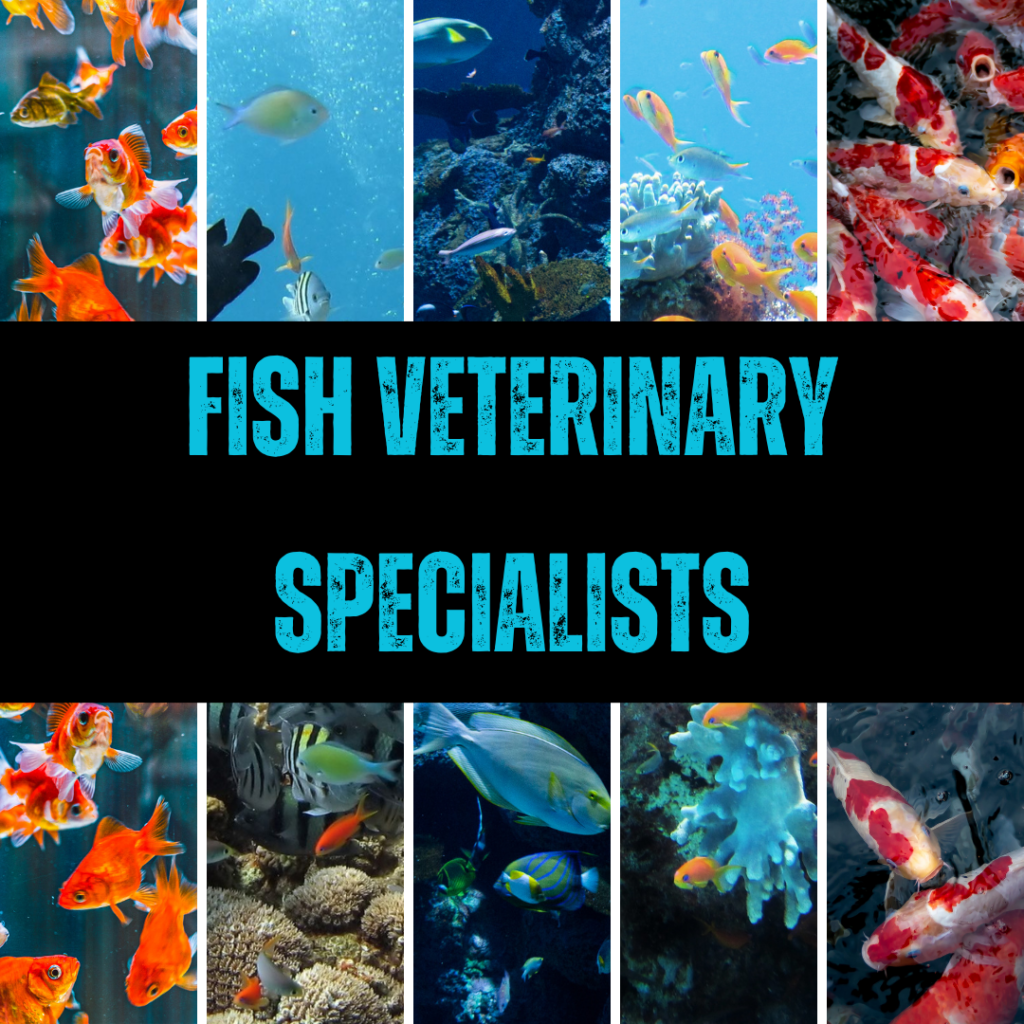For those of you looking to work with a fish veterinarian, we are thrilled to share that there is a new AVMA-recognized specialty in Fish Practice through the American Board of Veterinary Practitioners. But what does this mean? Here we will share everything you need to know about working with fish veterinary specialists and their associated titles.
DVM (Veterinarian)
At the base level, no one should be diagnosing or treating your fish without a veterinary license. Veterinary licenses are state based, but many veterinarians may have multiple veterinary licenses, allowing them to practice in multiple states. Depending on which veterinary school they attended, they may have had more exposure to fish than some. Our chief veterinarian, Dr. Jessie Sanders, attended Tufts Veterinary School and only had 2 total hours of fish lectures and one lab. However, she supplemented her traditional didactic training with additional summer programs, such as AQUAVET and MARVET, and externships at SeaWorld Orlando, the Marine Mammal Center, Mystic Aquarium and Aquatic Veterinary Services of Western New York.
Many veterinarians will claim that “vets don’t see or treat fish,” but this is completely wrong! If your veterinarian doesn’t want to see your fish, that is up to them, but there are two networks you should check out to find a veterinarian in your area. Both the American Association of Fish Veterinarians (AAFV) and the World Aquatic Veterinary Medical Association (WAVMA) have online databases of veterinarians who have additional training in fish medicine. For those veterinarians who want to see fish, but require additional support, our office offers direct consultations to work through diagnostics, interpreting results and formulating treatment plans. If you are struggling to find a veterinarian in your area to help your fish, please see our recommendations.
This does not included discussing your fish with friends or neighbors about some concerns you have seen and taking preventative steps. “Practicing medicine” specifically involves a diagnosis (even a preliminary or differential list) and a specific treatment. Regardless if you pay money or not, be wary of anyone offering their “services” for no compensation in a professional or para-professional capacity.
CertAqV (Certified Aquatic Veterinarian)
Before there was a confirmed board specialty, there was the Certified Aquatic Veterinarian certificate through the World Aquatic Veterinary Medical Association (WAVMA). This certificate identifies those veterinarians and technicians/nurses with core competency in aquatic veterinary medicine. Essentially, any veterinary professional can obtain this certification by obtaining 150 credit hours across nine KSEs (knowledge, skills and experience). These credits can be gathered from attending conferences, seeing cases, reading journal articles or professional presentations. Once the credits have been verified by a current Certified Aquatic Veterinarian, the certificate is awarded. Those with this certificate can use “CertAqV” after their name, but are technically not fish veterinary specialists.
Certification is good for 5 years, then must be recertified with an additional 50 hours. Fees apply to all of these programs and applicants are required to be full WAVMA members. Students can collect credits but will not be awarded a certificate until they graduate. See the full program guidelines.
Diplomate, American Board of Veterinarian Practitioners (Fish Practice) – Fish Veterinary Specialist
The newest specialty from the American Board of Veterinary Practitioners is the Fish Practice Specialist. 2023 welcomed the very first class of fish veterinary specialists including our chief veterinarian, Dr. Jessie Sanders. A “boarded specialty” is reserved for veterinarians who have proven knowledge and expertise above and beyond what is required to practice veterinary medicine. There are many veterinary board specialties including microbiology, radiology, surgery, anesthesia and more. Just like all of your human specialists that you see for various ailments, animals have the same specialized options when it comes to their care.
In order to qualify to apply for this credential, veterinarians must have a minimum of 5 years in practice or complete a residency with 3 years experience. There is no fish-specific residency training at this time, but will be added in the future. Applicants must see a certain percentage of fish cases per week/month, but do not have to be full time aquatic practitioners. Complete details are available in the ABVP Applicant Handbook.
Once they qualify and apply, there is a 350 question, 8 hour exam. It focuses on certain fish textbooks and all scientific publications within the last 5 years from a selection of professional journals. This includes aquaculture, aquariums, zebrafish, pet fish and regulatory medicine. It is a grueling exam, but necessary to demonstrate not only has the fish veterinary specialist has actually retained what they have learned. Once that exam is completed and passed, the veterinarian is now a fish veterinary specialist, designated by “DABVP (Fish Practice)” following their name.
So, you want to be a fish veterinary specialist?
If you decide that a fish veterinary specialist is your intended career path, we would love to have you join us! We strongly recommend getting involved with one of the aquatic-centric veterinary organizations to learn more and start amassing all of the credits and experience you will need to become an expert in fish practice.
- American Association of Fish Veterinarians (AAFV)
- World Aquatic Veterinary Medical Association (WAVMA)
- International Association of Aquatic Animal Medicine (IAAAM)
If you need some inspiration, we offer a free 10 CE credit online course on Careers in Aquatic Veterinary Medicine. Learn about 11 various aquatic veterinary disciplines and see if there are one or more that you are interested in learning more about.

